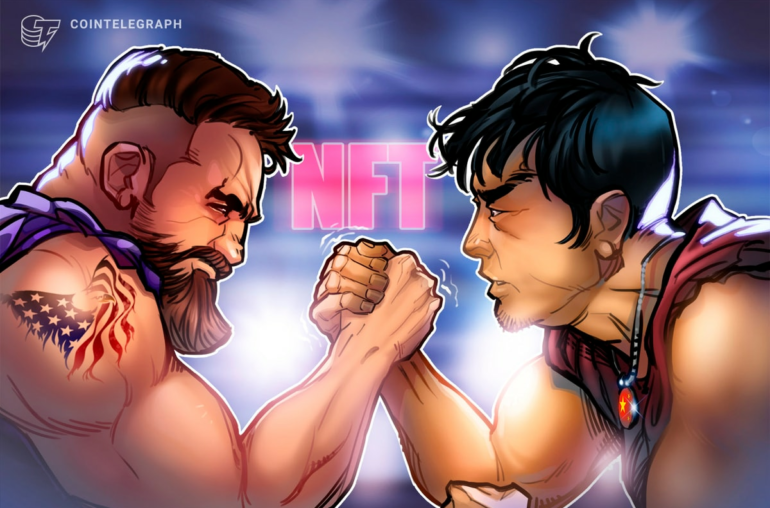As part of its new guidelines for the App Store, Apple has announced that it will allow developers to sell NFTs within apps and games. Despite the limitations and fees Apple attaches to certain types of NFT, this is a big deal because, as DigiDaigaku NFT project founder Gabriel Leydon tweeted, “…this could put an ETH wallet in every single mobile game onboarding 1B+ players!”
Apple’s New NFT Policy
Users can now sell and trade NFTs through a number of apps available on the Apple App Store. Apps that store or display NFTs may have been breaking Apple’s rules before this decision. In September 2021, Gnosis Safe, a crypto wallet that helps users manage and even sell digital assets on Ethereum, had been offering its app in the store for several months when it received notice from Apple that “Apps that access, whether it is just simple storage or marketplace, are not appropriate for the App Store. We suggest you remove this feature from your app.”
Developers can now sell NFTs with Apple’s approval. However, the company imposes the same monetization structure to NFT sales as it does to other App Store purchases: a 30 percent commission from app developers who earn over $1 million annually through the App Store and 15 percent from smaller sellers. Apple says apps can list, mint, and transfer NFTs and provide a mechanism for users to view their NFT collections as long as they do not unlock additional gameplay features or functionality within the app. Apps also can promote other NFT offers as long as they do not provide external links or purchase media that circumvent Apple’s payment system.
While it is one of the largest technology companies in the world, the Cupertino giant has done little to embrace blockchain technology, and its products are criticized for being too closed-off. This new development indicates that, while progress is slow, Apple is warming up to blockchain technology and its applications.
Apple’s 30% Solution Remains Controversial
Apple’s hefty commission tag has drawn criticism from the global crypto community and drawn contrasts to several other NFT markets. OpenSea and Magic Eden’s commissions hover around 5 percent; others have kept their transaction cost threshold as low as 2.5 percent.
Tech blogger Florian Mueller called Apple’s “app tax” on NFT sales “abusive but consistent”, adding that the actual costs to developers can frequently exceed the 30 percent commission cited when referencing the App Store, as some geographic regions are subject to fees as high as roughly 35% in addition to other fees applied to running search ads.
Persistent Apple critic, Epic Games CEO Tim Sweeney, also tweeted that Apple is “crushing” another nascent technology that “could rival its grotesquely overpriced in-app payment service,” and that Apple’s exorbitant fees could suffocate the entire NFT sector.
Apple’s commission policy is the basis for Epic Games’ lawsuit against Apple, which has been ongoing since 2020. The video game publisher sued Apple for not allowing it to use its payment platform instead of the App Store’s in-app purchases and for taking a 30% cut.
Challenges With The Secondary Market
Magic Eden, the largest Solana NFT marketplace, also needed clarification on the move, declining in-app trading support after hearing intense cost demands from Apple. “Our app remains available in the App Store as a tool showcasing Magic Eden listings and mints, but it does not have trading support,” a Magic Eden spokesperson said.
Secondary NFT sales are also problematic. Magic Eden and OpenSea, for example, typically charge a commission of no more than 5%.
“In this case, if a collector wants to buy an NFT through the Magic Eden or OpenSea app on an iPhone, the seller will only receive 70% of the purchase price,” Blockwork explained. “And the marketplace is unlikely to be interested in making up the difference.”
Apple’s decision to allow NFT sales at its standard premium is a significant roadblock for NFT startups. Several startups have complained about the rules Apple allegedly imposes, and that the fees make using the App store difficult to justify.
While a court decision last year required that Apple allow links to off-platform payment channels, this may not be relevant for NFT trading because Apple does not accept cryptocurrency payments. All item listings are in dollars and are paid in fiat. NFT marketplaces face the challenge of constructing additional infrastructure to support Apple’s payment system, and NFT dollar prices are constantly changing due to cryptocurrency volatility.
Few Blockchains Can Scale To Meet Apple’s User Base
But not all Web3 companies have balked at Apple’s policy. Some see benefits to Apple’s NFT acceptance because the market and Web3 apps available in its store gain the potential to achieve mass adoption. In addition, a 30 percent commission to Apple is better than being prohibited from the App Store altogether.
Apple can attract hundreds of millions, if not billions, of people to NFTs and crypto by validating crypto and NFTs. The gaming industry, home to approximately 4 billion online players right now, is another sector that could generate large commissions. By current estimates, fewer than 100,000 people play cryptocurrency games, so the integration into iOS apps could bring in thousands or millions of new users.
Conclusion
Apple’s decision to allow developers to sell NFTs in its App Store may be portentous. Apple has traditionally been very protective of how its platforms are used, and this move could be interpreted as a sign that it is beginning to loosen restrictions and open to other types of apps and services. Everything from blockchain-based games to decentralized social networks could fall under this category.
This news has been interpreted as exploitation of an emerging industry as well as the green light for Web3 applications to branch out from being the sole province of Android. The truth is that it is both. While this may not be the most significant development in the crypto space, it does show that Apple believes in the technology and wants to help it progress. Finally, it remains to be seen how Apple’s decision will impact the nascent crypto app ecosystem and the blockchain industry. For example, gaming may now find a niche within the expanding ecosystem, with developers encouraged to create more diverse games and users willing to invest more time and money into the blockchain world.
This new allowance for NFTs represents a significant step toward decentralizing digital data for a company that has long been obsessed with protecting its bottom line. It also demonstrates that Apple is taking notice of what blockchain offers.
The content of this article is intended to provide a general guide to the subject matter. Specialist advice should be sought about your specific circumstances.
Mr David B. Hoppe
Gamma Law
44 Montgomery Street, Suite 300
San Francisco
California 94104
UNITED STATES
Tel: 415901 0510
Fax: 415901 0512
E-mail: [email protected]
URL: www.gammalaw.com
© Mondaq Ltd, 2022 – Tel. +44 (0)20 8544 8300 – http://www.mondaq.com, source Business Briefing


